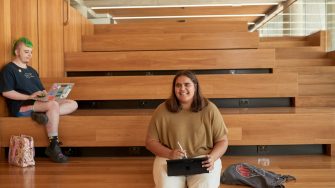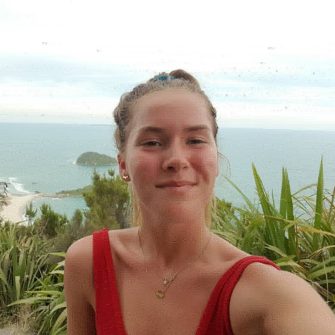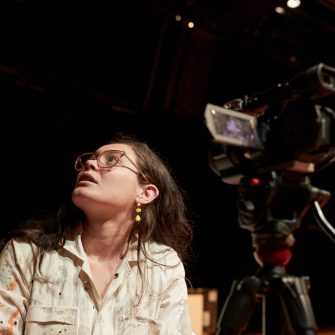Master of Counselling Social Work
- Commencing Terms
- Term 1
- Duration
- 2 Year(s)
- Delivery Mode
- Distance (online with some face-to-face), Face-to-face (includes blended), Online
- Campus
-
Kensington
- Codes
- Program code 8930
- CRICOS code -
-
Commonwealth Supported Places are available for this program2026 Indicative CSP first year fee
- $17,500*
-
2026 Indicative CSP fee to complete degree
- $17,500*
-
2026 Indicative first year full fee
- $47,500*
-
2026 Indicative full fee to complete degree
- $48,500*

Application closures for 2026
International applications for all undergraduate programs, as well as postgraduate programs offered by the faculties of Arts, Design & Architecture, Engineering (excluding Master of Information Technology and associated programs) and Science are now closed to New Overseas Student Commencement (NOSC) for 2026 intakes.
Postgraduate programs offered by the Business School and the faculties of Law & Justice and Medicine & Health remain open. Master of Information Technology (and associated programs) also remain open.
- Overview
- Entry requirements
- What will I study?
- Future careers
- How to apply
- Fees & Scholarships
Overview
The Master of Counselling Social Work (MCSW) is completed part-time over two years and is designed for practising social workers to extend their counselling and therapeutic skills. The program is built for flexibility, combining online delivery with Friday/Saturday intensives to support students with work and family commitments or those living outside Sydney or NSW.
You will participate in interactive intensives and seminars with a focus on practice skills and theory as well as in-depth analysis and application of ideas to your own social work practice. You’ll study core facets of the therapeutic relationship drawing on systemic and relational counselling approaches across a variety of practice contexts.
During your study engage with contemporary counselling frameworks including family therapy, interpersonal psychotherapy, cognitive, behavioural, mindfulness and trauma-based approaches. You’ll also gain advanced counselling skills, explore complex practice issues such as therapeutic impasse, grief, loss, trauma, and violence, and enhance your social work research knowledge. This postgraduate degree is also a pathway to a Professional Doctorate or PhD.
Why study at UNSW?
- We're ranked #1 in Australia and =#23 globally for social sciences and management (QS World University Rankings by Subject, 2025)
- Be supported by our diverse, open and inclusive Arts, Design & Architecture community.
- Learn through research-informed teaching
- Prioritise career success - UNSW has been awarded Most Employable students for six years in a row (Australian Financial Review (AFR) Top100 Future Leaders Awards, 2020–2025)
- Benefit from strong industry links and partnerships
- Access world-class alumni connections
- Join a global top 20 university (QS World University Rankings, 2024–2026)
- Join a community that’s part of the prestigious Group of Eight (Go8) universities
Want to see more from UNSW Arts, Design & Architecture?
Entry requirements
The admission requirements for the new Master of Counselling Social Work are as follows:
- A UNSW Bachelor of Social Work (Hons) degree or equivalent qualification
- Eligibility for membership of the Australian Association of Social Workers (AASW).
- At least one year counselling, case management, or other direct social work practice experience.
- Current employment in an organisational context where prospective students provide counselling, case management or other direct social work practice with clients. This is in contrast to social workers who work primarily in administrative, policy, or management roles.
Admission is subject to quota. Applications must include a brief curriculum vitae detailing relevant information about the entry requirements.
Eligibility of the AASW ensures that students are professional social workers, are committed to the values and ethics of the profession and have had prior education in social work practice methods including counselling. The AASW also expects social workers to have participated in professional development activities (of up to 30 hours per year) and to have received professional supervision. The MCSW facilitates learning in the counselling frameworks that support Accredited Mental Health Social Work status with the AASW.
These criteria ensure that applicants meet Level 9 of the Australian Qualifications Framework (AQF) and have the skills and knowledge to be capable of reaching the specified Learning Outcomes within the volume of learning of a 48 UOC Masters program.
English language requirements
You may be asked to provide evidence of your English proficiency to study at UNSW depending on your educational background and citizenship. English language skills are vitally important for coping with lectures, tutorials, assignments and examinations - this is why UNSW requires a minimum English language competency for enrolment.
If you’re completing an Australian Year 12 qualification (e.g. NSW HSC or equivalent), you do not need to provide anything extra to prove your proficiency. Your qualification will be used as evidence of your English proficiency.
If you do need to provide evidence of your English proficiency, this will be indicated in your application. You can prove this by providing evidence that you meet one or more of the following criteria:
- English language tests and university English courses
- Prior study in the medium of English
- Other qualifications
If you need to improve your English skills before you start your degree, UNSW College’s Academic English Programs are for you. The programs are suitable for various English levels and help you prepare for university studies and life in Australia.
For more details, visit the English Language Requirements page.
The admission requirements for the new Master of Counselling Social Work are as follows:
- A UNSW Bachelor of Social Work (Hons) degree or equivalent qualification
- Eligibility for membership of the Australian Association of Social Workers (AASW), meeting professional association requirements including professional development and supervision
- Two years of specialised counselling practice experience ensuring that students in the program are already skilled clinicians
- Current employment in an organisational context where prospective students are able to provide counselling, case management or other direct practice interventions with clients. This is in contrast to social workers who may have worked primarily in administrative or management roles.
Admission is subject to quota. Applications must include a brief curriculum vitae and the names and contact details of at least two professional referees.
Eligibility of the AASW ensures that students are professional social workers, are committed to the values and ethics of the profession and have had prior education in social work practice methods including counselling. The AASW also expects social workers to have participated in professional development activities (of up to 50 hours per year) and to have received professional supervision.
These criteria ensure that applicants meet Level 9 of the Australian Qualifications Framework (AQF) and have the skills and knowledge to be capable of reaching the specified Learning Outcomes within the volume of learning of a 48 UOC Masters program.
English language requirements
You may be asked to provide evidence of your English proficiency to study at UNSW depending on whether you are from an English-speaking background or non-English speaking background. English language skills are vitally important for coping with lectures, tutorials, assignments and examinations - this is why UNSW requires a minimum English language competency for enrolment.
If English is not your first language, you’ll need to provide proof of your English proficiency before you can be given an offer to study at UNSW. You can do this by providing evidence that you meet one or more of the following criteria:
- English language tests and university English courses
- Prior study in the medium of English
- Other qualifications
If you need to improve your English skills before you start your degree, UNSW College’s Academic English Programs are for you. The programs are suitable for various English levels and help you prepare for university studies and life in Australia.
For more details, visit the English Language Requirements page.
Check the specific English language requirements for this program
What will I study?
UNSW is introducing a new academic calendar from 2028.
We are moving to a new flex-semester calendar. What does this mean for your studies?
Full program structure
Future careers
Potential careers
- Specialist counselling positions in health, mental health and community services
- Clinical supervision
- Private counselling practice
- Training and management roles
Research pathways
The Master of Counselling Social Work is also a gateway to doctoral research.
How to apply
Applications must be submitted through our Apply Online portal. We encourage you to submit your completed application as early as possible to ensure it will be processed in time for your preferred term. Some high-demand programs and Faculties with limited places may have an earlier application deadline or commencement date. Find out more.
Ready to start your application?
For most international students, applications are submitted via our Apply Online service. We encourage you to submit your completed application as early as possible to ensure it will be processed in time for your preferred term.
Some high-demand programs with limited places, may have an earlier application deadline or may have an earlier commencement date. For details, visit the international admissions information page.
Ready to start your application?
Fees & Scholarships
*This part-time, two-year degree costs the same as one year of full-time study, making the First Year Fee and the Full Fee to Complete Degree identical.
You may be eligible for a Commonwealth Supported Place (CSP) for this degree/program. Domestic students who receive a CSP will have a substantial proportion of their fees subsidised by the Australian government. Start your postgraduate application today with our guide on how to apply.
*The indicative Commonwealth Supported Place (CSP) fees are an estimate based on the relevant student contribution band/s for a Commonwealth Supported Place undertaking a standard full-time load of 48 units of credit per year (1 Equivalent Full Time Student Load/1 EFTSL). To find out more about Commonwealth Supported Places visit Postgraduate Commonwealth Support.
Commonwealth Study Assistance such as Austudy, and Youth Allowance is available for some master’s degrees. For the most up-to-date information and list of degrees visit UNSW Current Student Financial Support.
*The indicative Commonwealth Supported Place (CSP) fees are an estimate based on the relevant student contribution band/s for a Commonwealth Supported Place undertaking a standard full-time load of 48 units of credit per year (1 Equivalent Full Time Student Load/1 EFTSL). To find out more about Commonwealth Supported Places visit Postgraduate Commonwealth Support.
Indicative fees are a guide only and have been calculated based on the typical enrolment patterns of students undertaking the degree/program. The indicative fee listed here is an estimate for tuition only and excludes non-tuition fees and charges. The amount you pay will vary depending on the calendar year of enrolment, the courses you select and whether your study load is more or less than 1 Equivalent Full Time Student Load (48 units of credit (UOC) per year).
You should not rely on indicative fees as fee increases are assessed when required and may exceed the indicative figures listed here. Actual fees are calculated on enrolment. More information on fees can be found at the UNSW fees website.
*Fees are subject to annual review by the University and may increase annually, with the new fees effective from the start of each calendar year. The indicative fees listed here are based on an estimated average and are for tuition only, other fees and charges are not included. The amount you pay will vary depending on the calendar year to enrol, the courses you select and whether your study load is more or less than 1 Equivalent Full Time Student Load (8 courses per year).
Indicative fees are a guide for comparison only based on current conditions and available data. You should not rely on indicative fees. More information on fees can be found at the UNSW fees website.
Indicative fees to complete the program have been calculated based on a percentage increase for every year of the program. Fee increases are assessed annually and may exceed the indicative figures listed here.
Indicative fees to complete the program include tuition plus an estimate of study-related costs of approximately $1,000 per year. To find out more about other costs, visit UNSW International.
Scholarships
At UNSW, we award over $83 million in scholarships each year. We pride ourselves on rewarding excellence and making university accessible to students from all walks of life. Whether you’re a domestic or international student, our range of scholarships, prizes and awards can support your journey.
Progress starts here – at a world-leading university

Top 20 Worldwide
Ranked in the global top 20 for three consecutive years
QS World University Rankings, 2024–2026

Winner of the AFR Most Employable University Award six years in a row
AFR Top100 Future Leaders Awards, 2020–2025

Australia's #1 for Innovation
Highest number of startups and spinouts from university-developed tech
SCOPR report, 2024





